【独家】河北省廊坊市香河三中2015-2016学年高二上学期第三次月考英语试卷
2015-2016学年高二上学期第三次月考英语试卷

高二年级第三次月考试题英语本试卷分为第I卷(选择题)和第II卷(非选择题)两部分第一部分听力(共两节,满分30分)第一节(共5小题;每小题1. 5分,满分7. 5分)听下面5段对话。
每段对话后有一个小题,从题中所给的A、B、C三个选项中选出最佳选项,并标在试卷的相应位置。
听完每段对话后,你都有10秒钟的时间来回答有关小题和阅读下一小题。
每段对话仅读一遍。
1. How much can the woman lend the man?A. 30 dollars.B. 25 dollars.C. 20 dollars.2. What is wrong with the man?A. He has a cough.B. He has a cold.C. He has a fever.3. How long has Mr. White been in the company?A. For more than 15 years.B. For less than 15 years.C. For 15 years.4. What will the woman probably do this summer holiday?A. Work in a rest aurant.B. Study in a language school.C. Work in a school.5. What will the man do with Julia?A. See a movie.B. Have dinner together.C. He hasn’t decided.第二节(共15小题;每小题1. 5分,满分22. 5分)听下面5段对话。
每段对话后有几个小题,从题中所给的A、B、C三个选项中选出最佳选项,并标在试卷的相应位置。
听每段对话前,你将有时间阅读各个小题,每小题5秒钟;听完后,各小题将给出5秒钟的作答时间。
每段对话读两遍。
高二年级英语第三次月考试卷.doc
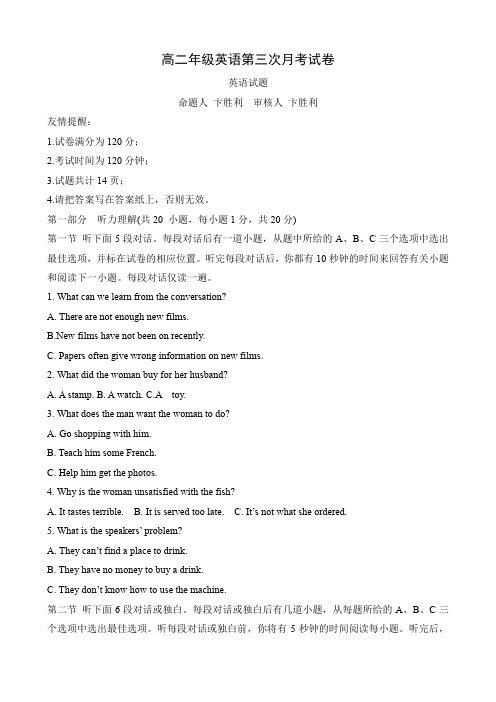
高二年级英语第三次月考试卷英语试题命题人卞胜利审核人卞胜利友情提醒:1.试卷满分为120分;2.考试时间为120分钟;3.试题共计14页;4.请把答案写在答案纸上,否则无效。
第一部分听力理解(共20 小题,每小题1分,共20分)第一节听下面5段对话。
每段对话后有一道小题,从题中所给的A、B、C三个选项中选出最佳选项,并标在试卷的相应位置。
听完每段对话后,你都有10秒钟的时间来回答有关小题和阅读下一小题。
每段对话仅读一遍。
1. What can we learn from the conversation?A. There are not enough new films.B.New films have not been on recently.C. Papers often give wrong information on new films.2. What did the woman buy for her husband?A. A stamp.B. A watch.C.A toy.3. What does the man want the woman to do?A. Go shopping with him.B. Teach him some French.C. Help him get the photos.4. Why is the woman unsatisfied with the fish?A. It tastes terrible.B. It is served too late.C. It’s not what she ordered.5. What is the speakers’ problem?A. Th ey can’t find a place to drink.B. They have no money to buy a drink.C. They don’t know how to use the machine.第二节听下面6段对话或独白。
高二英语月考试题及答案-廊坊市香河三中2015-2016学年高二上学期第三次月考试卷
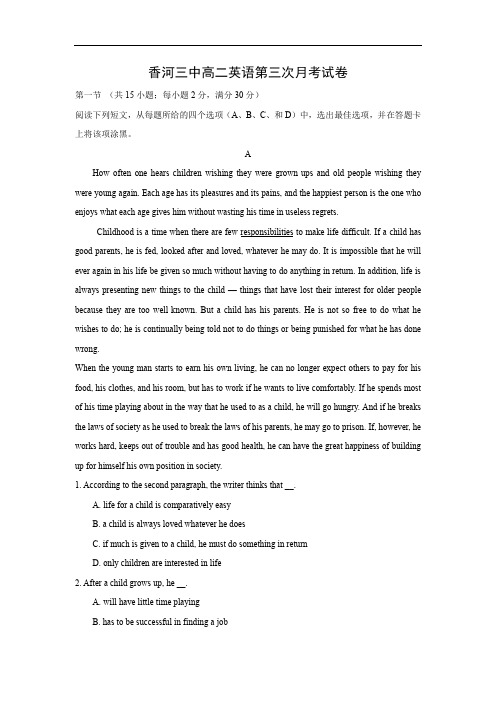
香河三中高二英语第三次月考试卷第一节(共15小题;每小题2分,满分30分)阅读下列短文,从每题所给的四个选项(A、B、C、和D)中,选出最佳选项,并在答题卡上将该项涂黑。
AHow often one hears children wishing they were grown-ups and old people wishing they were young again. Each age has its pleasures and its pains, and the happiest person is the one who enjoys what each age gives him without wasting his time in useless regrets.Childhood is a time when there are few responsibilities to make life difficult. If a child has good parents, he is fed, looked after and loved, whatever he may do. It is impossible that he will ever again in his life be given so much without having to do anything in return. In addition, life is always presenting new things to the child — things that have lost their interest for older people because they are too well-known. But a child has his parents. He is not so free to do what he wishes to do; he is continually being told not to do things or being punished for what he has done wrong.When the young man starts to earn his own living, he can no longer expect others to pay for his food, his clothes, and his room, but has to work if he wants to live comfortably. If he spends most of his time playing about in the way that he used to as a child, he will go hungry. And if he breaks the laws of society as he used to break the laws of his parents, he may go to prison. If, however, he works hard, keeps out of trouble and has good health, he can have the great happiness of building up for himself his own position in society.1. According to the second paragraph, the writer thinks that __.A. life for a child is comparatively easyB. a child is always loved whatever he doesC. if much is given to a child, he must do something in returnD. only children are interested in life2. After a child grows up, he __.A. will have little time playingB. has to be successful in finding a jobC. can still ask for help in time of troubleD. should be able to take care of himself3. The underlined word "responsibilities" in the second paragraph means__________.A. dutiesB. jobsC. suggestionsD. desires4. The main idea of the passage is _________ .A. life is not enjoyable since each age has some painsB. young men can have the greatest happiness if they work hardC. childhood is the most enjoyable time in one's lifeD. one is the happiest if he can make good use of each age in his lifeBWhen was the last time you lost something? What was it?According to a recent survey, we spend about ten minutes a day looking for lost things. Over an average lifetime, this adds up to an incredible 3,680 hours (or 153 days). Is there anything we can do about it?The study of 3,000 adults was carried out by home insurance company Esure. They found that mobile phones and car keys were the most frequently lost items. Other things on the list included: house keys, bills, sunglasses, wallets, bank cards, watches, jewellery (particularly rings and earrings).So, what’s going on? “Most blame it on a busy lifestyle,” says Nikki Sellers, the head of Esure. Others say it’s the fault of spouses (配偶) or children for not putting things back where they belong. A few admitted to untidiness, absent-mindedness and a poor memory, with some wishing they were more organized.What’s the solution? “You need to choose a particular place for something and always put it back there,” said Nikki Sellers. “And you need to make sure everyone else in the house knows where to put it back too. You also need to keep your house tidy, label boxes clearly and find a place near the front door for all the items that you need in the morning. A good idea would be to have a shelf there with a bowl for your keys, purse, wallet and anything else.” she added.If you are still having trouble finding things, don’t worry —things could be a lot worse: fourteen people in the survey said they spent over an hour every day looking for lost items. Surelyyou can’t be as bad as that!5. According to the survey, which do people lose most frequently?A. House keys.B. Cell phones.C. Bank cards.D. Sunglasses.6. The majority of people surveyed think that they lose something because of _______.A. lack of organization.B. their bad memoryC. the fault of their family membersD. their busy life7. From the text we learn that ________.A. many people in the survey spend over an hour looking for the lost itemsB. Nikki Sellers suggests always putting things back where they wereC. the author is quite worried about those who have trouble finding thingsD. a shelf near the front door is a must if you are to avoid losing moneyCExperts say it is not easy to get used to life in a new culture. “ Culture shock” is the term these experts use when talking about the feelings that people have in a new environment. There are three stages of culture shock, say the experts. In the first stage, the newcomers like their new environment. Then, when the fresh experience dies, they begin to hate the city, the country, the people and everything else. In the last stage, the newcomers begin to adjust to their surroundings and, as a result, enjoy their life more.There are some obvious factors in culture shock. The weather may be unpleasant. The customs may be different. The public service systems---the telephone, post office ,or transportation --may be difficult to work out. The simplest things seem to be big problems. The language may be difficult.Who feels culture shock? Everyone does in this way or that. But culture shock surprises most people. V ery often the people having the worst culture shock are those who never had any difficulties in their home countries and were successful in their community. Coming to a new country, these people find they do not have the same established positions. They find themselves without a role, almost without an identity. They have to build a new self-image.Culture shock causes a feeling of disorientation (迷惘). This feeling may be homesickness. When homesick, people feel like staying inside all the time. They want to protect themselves from the strange environment, and create an escape inside their room for a sense of security. Thisescape does solve the problem of culture shock for the short term, but it does nothing to make the person familiar with the culture. Getting to know the new environment and gaining experience--these are the long-term solutions to the problem of culture shock.8.According to the passage, the more successful you are at home, _________________.A. the fewer difficulties you may have abroadB. the more difficulties you may have abroadC. the more money you will earn abroadD. the less homesick you will feel abroad9.Which of the following is NOT right according to the passage?A. “Culture shock” is a term used to describe the feelings that people experience in a newenvironmentB. In the second stage of “ Culture shock”, people may hate the life in the new environmentC. When you are homesick, you had better not stay at home all the timeD. Every one of us doesn’t feel culture shock in this way or that10.What is the main idea of the last paragraph?A. Escape unfamiliar environmentB. The feeling of homesicknessC. The best way to overcome (克服、战胜)culture shock: get familiar with the new cultureD. Homesickness can solve the problem of culture shock11.What’s the meaning of the underlined word adjust?A. comeB. pastC. adaptD. setDWhen I decided to get married, my father decided to share some wisdom. “Lori, it is ju st as easy to love a rich man as it is to love a poor man, “ he said. My boyfriend didn’t have much money, but I loved him. “What?” I cried. “ How can you say that? I want to marry for love, NOT for money.” “ But why not marry someone you love who has money?” he asked. “Rich men are materialistic(物质主义的). I’d rather marry a poor man who loves me,” I said and he gave in.And as we went on, with my family growing, I learned why my father put such importance on money. We had to cover the rent, car, electricity, food, and medical bills. We were under lot of pressure. The worries over whether we would be asked to move out or if we had the money towash our clothes at the Laundromat this week made me question if I did the right thing by marrying a “poor” man.I rea lized that I had entered the ranks of the poor. Not that I’d ever been rich. Most of my life, I considered us in the lower middle-class rank. We had a house of our own, food on the table, cars, clothes, and money for college. But now, as I listened to an apartment neighbour talk about her monthly “Mother’s Day” gift, I realized she was talking about her welfare check(政府发放的救济金). And another young mother tried to “help” me out by connecting me with a friend who stole baby clothes from a department store. “ For a small cut,” she said, “ I could return my ‘purchase’(购买的东西)for cash.” It made me sick. How poor was I?I had a college education but wasn’t using it. I insisted on not missing a minute of our children’s childhood and it came at a price. My husband was working as hard as he could and it wasn’t enough. But somehow we made it.The kids grew. Today, we look back and see the great values gained by going through those hard years. My children are not materialistic. They never thought they were poor growing up because we always managed to give a little bit of food, money, or clothes to the “poor”. They were satisfied with the simple things in life that come free such as a beach day or a horse back ride from their dad.We had our worries, but we still treasured our very favorite part of the day when we’d nest (栖息地)under the covers and talked about our future, the kids and how much we loved each other. Sure our financial(财政的) troubles caused a lot of fights, but we didn’t leave each other. We began to live a better life. We moved to a better community(社区)with good schools for the kids. And soon, we’ll face a new challenge with wealth. But we’ll never give up.My father died three years ago. Before he died, he knew I made the right choice. I’m proud of my decision.12.After getting married, the writer questioned if she had done the right thing to marry herhusband because___________.A. she was often scolded(责骂)by her fatherB. she found her husband was irresponsible(不负责任的)C. he didn’t think her husband loved her de eplyD. they lived a poor life with children to support13.After their children were born, the writer_______________.A. often regretted not using her college educationB. worked very hard in order to make more moneyC. had to steal baby clothes from a department storeD. looked after her children as a professional (职业的,专业的)housewife14. Why didn’t the writer’s children think they were poor growing up?A. Because the writer always gave them whatever they wantedB. Because the writer and her children often helped other people.C. Because the writer didn’t let her children play with their rich neighboursD. Because the writer let her children have a good life through receiving help from others.15.What do you think is the theme(主题)of the story?A. Women should always make a decision by themselvesB. Listening to the old is important when people get marriedC. Money doesn’t matter as much as love in marriageD. Children don’t mind whether they have a poor family or not第二节(共5小题;每小题2分,满分10分)根据短文内容,从短文后的选项中选出能填入空白处的最佳选项。
高二英语上学期第三次月考(期中)试题-人教版高二全册英语试题
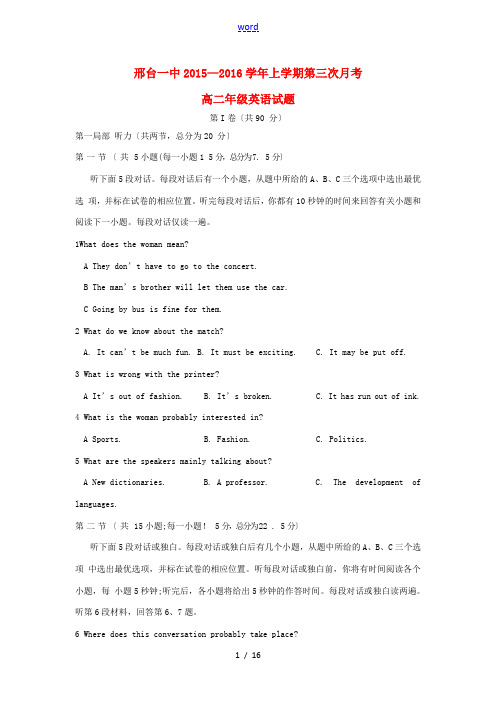
邢台一中2015—2016学年上学期第三次月考高二年级英语试题第I卷〔共90 分〕第一局部听力〔共两节,总分为20 分〕第一节〔共5小题(每一小题1 5分,总分为7. 5分〕听下面5段对话。
每段对话后有一个小题,从题中所给的A、B、C三个选项中选出最优选项,并标在试卷的相应位置。
听完每段对话后,你都有10秒钟的时间来回答有关小题和阅读下一小题。
每段对话仅读一遍。
1What does the woman mean?A They don’t have to go to the concert.B The man’s brother will let them use the car.C Going by bus is fine for them.2 What do we know about the match?A. It can’t be much fun.B. It must be exciting.C. It may be put off.3 What is wrong with the printer?A I t’s out of fashion. B. It’s broken. C. It has run out of ink.4 What is the woman probably interested in?A Sports. B. Fashion. C. Politics.5 What are the speakers mainly talking about?A New dictionaries. B. A professor. C. The development of languages.第二节〔共15小题;每一小题! 5分,总分为22 . 5分〕听下面5段对话或独白。
每段对话或独白后有几个小题,从题中所给的A、B、C三个选项中选出最优选项,并标在试卷的相应位置。
听每段对话或独白前,你将有时间阅读各个小题,每小题5秒钟;听完后,各小题将给出5秒钟的作答时间。
英语-河北省香河县第三中学2017-2018学年高二下学期期中考试试题
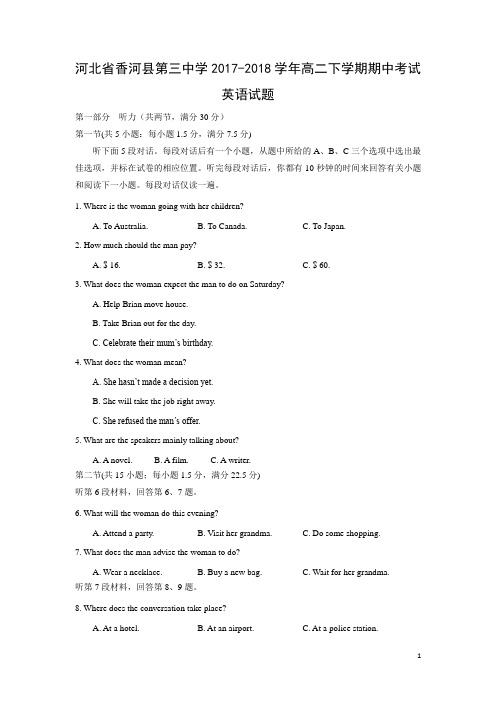
河北省香河县第三中学2017-2018学年高二下学期期中考试英语试题第一部分听力(共两节,满分30分)第一节(共5小题:每小题1.5分,满分7.5分)听下面5段对话。
每段对话后有一个小题,从题中所给的A、B、C三个选项中选出最佳选项,并标在试卷的相应位置。
听完每段对话后,你都有10秒钟的时间来回答有关小题和阅读下一小题。
每段对话仅读一遍。
1. Where is the woman going with her children?A. To Australia.B. To Canada.C. To Japan.2. How much should the man pay?A. $ 16.B. $ 32.C. $ 60.3. What does the woman expect the man to do on Saturday?A. Help Brian move house.B. Take Brian out for the day.C. Celebrate their mum‟s birthday.4. What does the woman mean?A. She hasn‟t made a decision yet.B. She will take the job right away.C. She refused the man‟s offer.5. What are the speakers mainly talking about?A. A novel.B. A film.C. A writer.第二节(共15小题;每小题1.5分,满分22.5分)听第6段材料,回答第6、7题。
6. What will the woman do this evening?A. Attend a party.B. Visit her grandma.C. Do some shopping.7. What does the man advise the woman to do?A. Wear a necklace.B. Buy a new bag.C. Wait for her grandma.听第7段材料,回答第8、9题。
高二英语上学期第三次月考试题高二全册英语试题_2 (3)
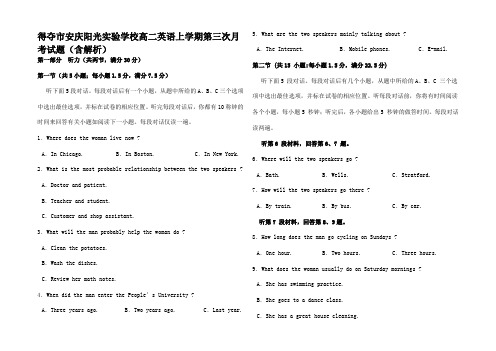
得夺市安庆阳光实验学校高二英语上学期第三次月考试题(含解析)第一部分听力(共两节,满分30分)第一节(共5小题;每小题1.5分,满分7.5分)听下面5段对话。
每段对话后有一个小题,从题中所给的A、B、C三个选项中选出最佳选项,并标在试卷的相应位置。
听完每段对话后,你都有10称钟的时间来回答有关小题如阅读下一小题。
每段对话仅读一遍。
1.Where does the woman live now ?A.In Chicago. B.In Boston. C.In New York. 2.What is the most probable relationship between the two speakers ? A.Doctor and patient.B.Teacher and student.C.Customer and shop assistant.3.What will the man probably help the woman do ?A.Clean the potatoes.B.Wash the dishes.C.Review her math notes.4.When did the man enter the People’s University ?A.Three years ago. B.Two years ago. C.Last year.5.What are the two speakers mainly talking about ?A.The Internet. B.Mobile phones. C.E-mail.第二节 (共15 小题;每小题1.5分,满分22.5分)听下面5 段对话。
每段对话后有几个小题,从题中所给的A、B、C 三个选项中选出最佳选项,并标在试卷的相应位置。
听每段对话前,你将有时间阅读各个小题,每小题5 秒钟;听完后,各小题给出5 秒钟的做答时间。
河北省香河县第三中学_学年高二英语上学期期中试题

河北省香河县第三中学2018-2019学年高二英语上学期期中试题本试卷分第I卷(选择题)和第II卷(非选择题)两部分;共150分;考试时间120分钟。
第I卷第一部分听力(共两节,满分30分)第一节(共5小题;每小题1. 5分,满分7. 5分)听下面5段对话。
每段对话后有一个小题,从题中所给的A、B、C三个选项中选出最佳选项,并标在试卷的相应位置。
听完每段对话后,你都有10秒钟的时间来回答有关小题和阅读下一小题。
每段对话仅读一遍。
1.What did the woman do today?A.She did nothing. B.She wrote letters. C.She practiced the piano. 2.What does the man say about Delta Restaurant?A.The service was better.B.The food was delicious.C.The menu was attractive.3.What vehicle will the woman probably take tomorrow?A.A bus. B.A taxi. C.The subway.4.How much will the woman pay?A.$3. B.$6. C.$9.5.What are the speakers mainly talking about?A.A book. B.A teacher. C.An exam.第二节(共15小题;每小题1.5分,满分22.5分)听下面5段对话或独白。
每段对话或独白后有几个小题,从题中所给的A、B、C三个选项中选出最佳选项,并标在试卷的相应位置。
听每段对话或独白前,你将有时间阅读各个小题,每小题5秒钟;听完后,各小题将给出5秒钟的作答时间。
每段对话或独白读两遍。
听第6段材料,回答第6、7题。
6.What is the woman probably?A.A hotel clerk. B.A house agent. C.A shop assistant.7.What is the pillow filled with?A.Cotton. B.Dried flowers. C.A special material.听第7段材料,回答第8至l0题。
高二英语上学期第三次月考试题高二全册英语试题_
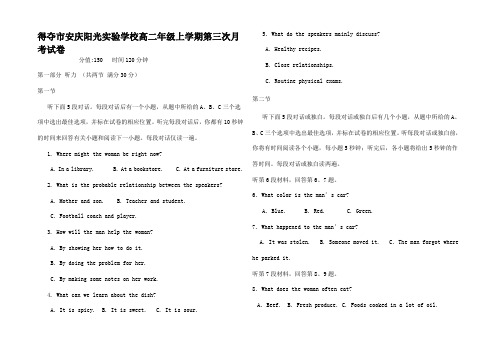
得夺市安庆阳光实验学校高二年级上学期第三次月考试卷分值:150 时间120分钟第一部分听力(共两节满分30分)第一节听下面5段对话。
每段对话后有一个小题,从题中所给的A、B、C三个选项中选出最佳选项,并标在试卷的相应位置。
听完每段对话后,你都有10秒钟的时间来回答有关小题和阅读下一小题。
每段对话仅读一遍。
1. Where might the woman be right now?A. In a library.B. At a bookstore.C. At a furniture store.2. What is the probable relationship between the speakers?A. Mother and son.B. Teacher and student.C. Football coach and player.3. How will the man help the woman?A. By showing her how to do it.B. By doing the problem for her.C. By making some notes on her work.4. What can we learn about the dish?A. It is spicy.B. It is sweet.C. It is sour.5. What do the speakers mainly discuss?A. Healthy recipes.B. Close relationships.C. Routine physical exams.第二节听下面5段对话或独白。
每段对话或独白后有几个小题,从题中所给的A、B、C三个选项中选出最佳选项,并标在试卷的相应位置。
听每段对话或独白前,你将有时间阅读各个小题,每小题5秒钟;听完后,各小题将给出5秒钟的作答时间。
每段对话或独白读两遍。
河北省廊坊市香河三中高一上学期第三次月考英语试卷 含答案
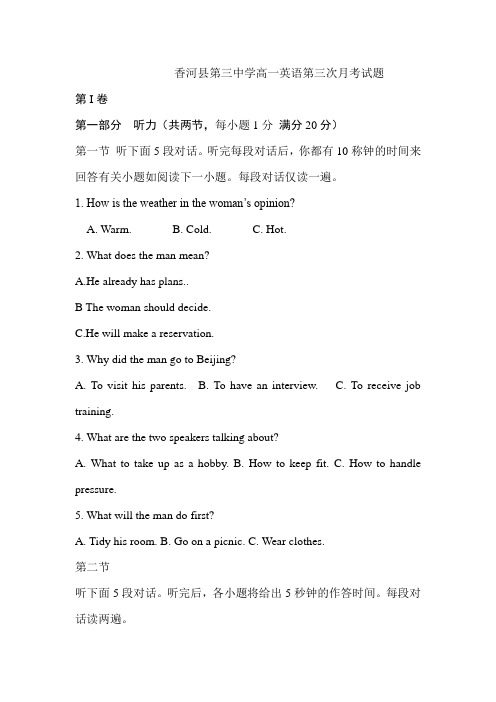
香河县第三中学高一英语第三次月考试题第I卷第一部分听力(共两节,每小题1分满分20分)第一节听下面5段对话。
听完每段对话后,你都有10称钟的时间来回答有关小题如阅读下一小题。
每段对话仅读一遍。
1. How is the weather in the woman’s opinion?A. Warm.B. Cold.C. Hot.2. What does the man mean?A.He already has plans..B The woman should decide.C.He will make a reservation.3. Why did the man go to Beijing?A. To visit his parents.B. To have an interview.C. To receive job training.4. What are the two speakers talking about?A. What to take up as a hobby.B. How to keep fit.C. How to handle pressure.5. What will the man do first?A. Tidy his room.B. Go on a picnic.C. Wear clothes.第二节听下面5段对话。
听完后,各小题将给出5秒钟的作答时间。
每段对话读两遍。
听下面一段对话,回答第6和第7两个小题。
6.What are the two speakers doing?A. Seeing a movie.B. Having dinner.C. Making soup.7.What makes the man unhappy?A.The woman doesn’t cook very well.B. The woman seldom talks to him at dinner.C. The woman watches too many commercials.听下面一段对话,回答第8和第9两个小题。
高二英语3月月考试题高二全册英语试题_5
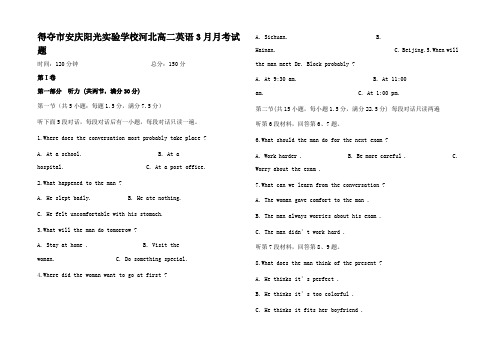
得夺市安庆阳光实验学校河北高二英语3月月考试题时间:120分钟总分:150分第Ⅰ卷第一部分听力 (共两节,满分30分)第一节(共5小题:每题1.5分,满分7.5分)听下面5段对话,每段对话后有一小题,每段对话只读一遍。
1.Where does the conversation most probably take place ?A. At a school.B. At ahospital. C. At a post office.2.What happened to the man ?A. He slept badly.B. He ate nothing.C. He felt uncomfortable with his stomach.3.What will the man do tomorrow ?A. Stay at home .B. Visit thewoman. C. Do something special.4.Where did the woman want to go at first ?A. Sichuan. B.Hainan. C. Beijing.5.When will the man meet Dr. Block probably ?A. At 9:30 am.B. At 11:00am. C. At 1:00 pm.第二节(共15小题,每小题1.5分,满分22.5分) 每段对话只读两遍听第6段材料,回答第6、7题。
6.What should the man do for the next exam ?A. Work harder .B. Be more careful .C. Worry about the exam .7.What can we learn from the conversation ?A. The woman gave comfort to the man .B. The man always worries about his exam .C. The man didn’t work hard .听第7段材料,回答第8、9题。
河北省廊坊市香河县第三中学2021年高二英语月考试卷含解析
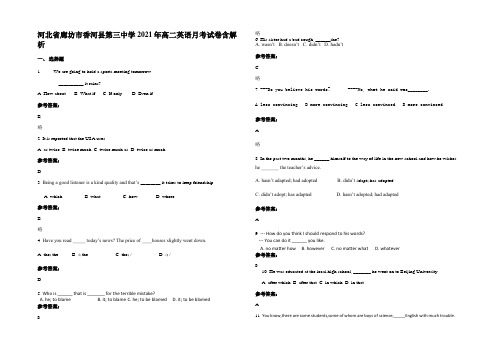
河北省廊坊市香河县第三中学2021年高二英语月考试卷含解析一、选择题1. ------ We are going to hold a sports meeting tomorrow.------__________ it rains?A. How aboutB. What ifC. If onlyD. Even if参考答案:B略2. It is reported that the USA usesA. as twiceB. twice muchC. twice much asD. twice as much参考答案:D3. Being a good listener is a kind quality and that’s ________ it takes to keep friendship.A. whichB. whatC. howD. where参考答案:B略4. Have you read _____ today’s news? The price of ____houses slightly went down.A. the; theB. /; theC. the; /D. /; /参考答案:D5. Who is ______ that is _______ for the terrible mistake?A. he; to blameB. it; to blameC. he; to be blamedD. it; to be blamed参考答案:B 略6. His sister had a bad cough, ______she?A. wasn’tB. doesn’tC. didn’tD. hadn’t参考答案:C略7. ---Do you believe his words? ----No, what he said was________.A less convincingB more convincingC less convincedD more convinced参考答案:A略8. In the past two months, he ______ himself to the way of life in the new school and how he wishes he _______ the teacher’s advice.A. hasn’t adapted; had adoptedB. didn’t a dapt; has adoptedC. didn’t adopt; has adaptedD. hasn’t adopted; had adapted参考答案:A9. --- How do you think I should respond to his words?--- You can do it ______ you like.A. no matter howB. howeverC. no matter whatD. whatever参考答案:B10. He was educated at the local high school, _______ he went on to Beijing University.A. after whichB. after thatC. in whichD. in that参考答案:A11. You know,there are some students,some of whom are boys of science,_____English with much trouble.A.having learnedB.learningC.being learningD.are learning参考答案:B句意:你知道有一些学生,其中有一些是学习英语有困难的理科的男生。
中学15—16学年上学期高二第三次月考英语试题(附答案)

高二英语第三次月考试题一. 单项填空(共20小题;每小题1分,满分20分)1.I don’t think I am __________; it is said that _________ is the mother of success.A. a failure; failureB. failure; a failureC. a failure; a failureD. failure; failure2.The government tried its best to ________ the people’s needs, but the people were still not _________ . In fact, what the government did was not ________.A.satisfy; satisfying; satisfiedB. satisfy; satisfied; satisfyingB.satisfied; satisfied; satisfying D. satisfying; satisfied; satisfied3.The house rent is expensive. I’ve got about half the space I had three years ago and I’m paying _______ before.A.as three times much asB. as much three times asC.much as three times asD. three times as much as4.I’d rather ________ at home than _________ out in such bad weather.A.Staying; goingB. staying; goC. stay; goD. stay; going5.I regret _______ that I’m busy ______ my lessons.A.to say; to prepareB. to say; preparingC. saying; to prepareD. saying; preparing6.----Yo u’re coughing badly, Martin. Why not give up smoking?---Give up smoking? Easier said than done, Amy. Once you ________ the habit of smoking, it is very hard for you to _______ .A.keep up; break it awayB. take up; drop it outC. pick up; get rid of itD. build up; do away with it7. There is no point arguing about what ________ the accident. I’d rather you _________ the victims of it.A. led to; focus onB. led to; focused onC. caused; focus onD. caused to; focused to8. No matter where he is, he makes _________ a rule to go for a walk before breakfast.A. himB. thisC. thatD. it9. He was in the mountain for a year. He felt as if he was ________ from the outside world.A. cut outB. cut inC. cut offD. cut up10. Those who are not _______ with the progress they have made will work harder.A. proudB. afraidC. popularD. content11. Scientists are convinced ___________ the positive effect of laughter ___________ physical and mental health.A. of; atB. by; inC. of; onD. on; at12. How are the things in your village?Modern farming methods have been brought in and the villagers are ________ now than before.A.well offB. better offC. badly offD. worse off13. Up to now nobody _______ do this better than Charlie Chaplin.A. Is able toB. has been able toC. have been able toD. are able to14. _________ with the __________ speech, some of the audience fall asleep.A. bored; boringB. boring; boredC. bored; boredD. boring; boring15. –Why did she spend so much time searching shop after shop only for a blouse?--- Oh, she was very ________ about her clothes.A. CuriousB. carefulC. crazyD. particular16. It is believed that if an event is ________ in the paper, it will surely ________ its readers.A. astonished; astonishB. astonishing; be astonishedC. astonishing; astonishD. astonished; be astonished17. The gentleman __________ to the beautiful lady was trying to persuade her into acting in his new film.A. whisperB. whisperedC. to whisperD. whispering18. Only then _______ how much damage had been caused.A. did she realizeB. she realizedC. had she realizedD. she had realized19. Progress so far has been very good._________ , we are sure that the project will be completed on time.A. howeverB. OtherwiseC. ThereforeD. Besides20. Our teacher looked here and there on our playground _______ looking for something.A. even thoughB. even ifC. only ifD. as if二.完形填空(共20小题,每小题1分,满分20分)I became lame(瘸的)in both legs in my childhood. I can’t stand 16 the support of two sticks. Only in my wheelchair can I “ 17 ”.I still remember the first day at 18 . When I appeared at the door, 19 in the classroom stared (凝视)at me in 20 . My face turned 21 . I couldn’t help22 back. It was the 23 and sympathy(同情)in their eyes that 24 me doing so. I went shyly towards an unoccupied (空的) seat.Being lame, I didn’t dare (敢) to 25 in front of my classmates. I was afraid that I might be 26 at. In those days I was very sad to see others walking 27 .One day, a few students came up to me and asked me to go outside. I was really 28 . They encouraged me with a(n) 29 smile and 30 me in my wheelchair from place to place. I was 31 to them for giving me a chance to see the 32 of our lovely school with my own eyes.After that we often read, played and talked together. My friends are always 33 to help me. It made me 34 I am handicapped (残疾的).Once they asked me, “What is the most beautiful thing in our school?” Without hesitation (犹豫) I said, “It is the 35 . ”21. A. with B. without C. under D. on22. A. walk B. run C. sit D. stand23. A. school B. wheelchair C. home D. hospital24. A. he B. she C. everyone D. nobody25. A. thought B. interest C. anger D. surprise26. A. red B. brown C. white D. black27. A. entering B. hiding C. coming D. turning28. A. feeling B. kindness C. sorrow D. pain29. A. made B. stopped C. kept D. let30. A. walk B. study C. practice D. speak31. A. laughed B. smiled C. stared D. looked32. A. quickly B. slowly C. happily D. shyly33. A. brave B. sad C. hurt D. excited34. A. honest B. friendly C. luckily D. handsome35. A. pushed B. placed C. drew D. pulled36. A. satisfied B. sorry C. loyal D. thankful37. A. signs B. sights C. buildings D. students38. A. ready B. smart C. wise D. unwilling39. A. forget B. remember C. imagine D. think40. A. teachers B. schoolyard C. classmates D. friendship三、阅读理解(共20小题;每小题2分,满分40分)A( )41.If Joe wanted to buy the cheapest ticket for Peak Day,he could book(预定)one during .A.Pre - sale ⅠB.Pre – sale ⅡC.Pre – sale ⅢD.Expo Session ( )42.On March 1,2010,Sue bought two Standard Day tickets for her parents.She paid for them.A.¥380 B.¥300 C.¥260 D.¥180( )43.It cost Thomas ¥160 to get a ticket for Standard Day.He probably bought it on .A.April 23,2009 B.August l,2009 C.February 2,2010 D.May 20,2010 ( )44.Kathy spent 900 yuan on a ticket for Shanghai Expo.Her visit can last days.A.one B.three C.seven D.ten( )45.Visitors to Shanghai Expo could buy tickets only after May 1,2010.A. morning B.afternoon C.evening D.midnightBThe weather is getting hotter. You are thirsty playing basketball or riding home from school. A cold drink may be just the thing. But be careful what you are drinking. Something that looks cool may not be good for your health.There are plenty of "energy drinks" on the market. Most of them have beautiful colors and cool names. The lists on them tell you they are helpful to your health. Sounds great!But after a careful check you may find that most energy drinks have lots of caffeine (咖啡因) in them. These drinks are especially aimed at young people, students, busy people and sports players. Makers sometimes say their drinks make you better at sports and can keep you awake. But be careful not to drink too much.Caffeine makes your heart beat fast. Because of this, the International Olympic Committee has limited( 限制) its use. Caffeine in most energy drinks is at least as strong as that in a cup of coffee or tea. Possible health dangers have something to do with energy drinks. Just one box of energy drink can make you nervous, have difficulty sleeping and can even cause heart problems. Scientists say that teenagers should be discouraged from taking drinks with a lot of caffeine in them.46. Many people like drinking energy drinks because of the following EXCEPT that ________.A. they have beautiful colors and cool namesB. they have lots of caffeineC. they can keep them awake and better at sportsD. they are said to be helpful to health47. The main reason for people not to drink too much energy drinks is that they may cause _____.A. heart problemsB. nervousnessC. sleeping difficultyD. possible health dangers48. The underlined word "discouraged" can be replaced(替换) with "________".A. encouragedB. stoppedC. helpedD. disliked49. From the passage we can know that _________.A. advertisements are important in getting people to buy energy drinksB. energy drinks are helpful to teenagers' studyC. sports players need to drink a lot of energy drinksD. energy drinks are especially aimed at teenagers50. Which of the following can be the best title(标题) of the passage?A. What's the Use of Energy Drinks?B. Who Can Drink Energy DrinksC. What's That in Energy Drinks?D. Why Can't We Buy Energy Drinks?CDoctor Seuss was born in 1904. By the middle 1950s, he had become one of the best-loved and most successful children's book writers in the world. His books are very popular with young readers. They enjoy the invented words and the pictures of unusual funny animals and plants.In 1954, life magazine published(刊登) a report about school children who could not read. The report said many children's books were not interesting. Doctor Seuss strongly hoped to help children and decided to write books that were interesting and easy to read. He used words with the same ending sound, like fish and wish. He did not receive training in art. Yet, he drew the pictures for most of his books.In 1957, Dr. Seuss wrote The Cat in the Hat. He used less than 230 words to write the book and even a six-year-old should be able to read it. It was a fun story and easy to read. Children loved it. Their parents loved it, too. Today it is still one of the stories they like best. The success of The Cat in the Hat made him want to write more books for children. In 1960, he wrote a book using less than fifty words. The book is called Green Eggs and Ham.In 1984, Doctor Seuss won a Pulitzer Prize (普利策奖). He was honored for the education and enjoyment his books provided American children and their parents.He died at the age of 87, but his influence remains. Millions of his books have been sold worldwide. People say his books helped change the way American children learned to read. Yet, his books are loved by people of all ages. Doctor Seuss once said, "I do not write for children. I write for people.( )51. Doctor Seuss learned from the magazine that _______.A. some school children could not readB. many children's books were interestingC. children wanted to learn to readD. a writer for children was wanted( )52. People like his books because the books ______.A. are cheap and easy to getB. were written in different languagesC. are easy and interesting to readD. were written with invented words( )53. He wrote the book The Cat in the Hat at the age of _____.A. 50B. 53C. 56D. 87( )54. Which of the following is TRUE according to the passage?A. Doctor Seuss wrote Green Eggs and Ham with over 230 words.B. Doctor Seuss wrote books only for children in the United States.C. The Cat in the Hat was written only for six-year-old children.D. His books provided education and enjoyment for Americans.( )55. From the text we know that Doctor Seuss __________.A. won a Pulitzer Prize soon after his deathB. sold millions of his books himself worldwideC. changed American children's way of readingD. wrote the largest number of books in the worldDCan you imagine a world without the Internet? It’s surprising to think about it.Now, China has more than 162 million Internet users, according to the China Internet Network Information Centre. This is the second highest number of user in the world after the United States. Today, 66%of Chinese “netizens (网民)” are teenagers. “They spend about thirteen hours every week online,” said Qian Hulin, an Internet expert(专家). Doctor Song in Beijing Xuanwu Hospital said about 14% of Chinese netizens who are teens often lasted over ten hours to play online games.The main reasons why teenagers surf the Web are to search for information, to communicate with others and to have fun. On the Internet, teenagers can find out almost anything. And surfing the Web can help students with their homework and widen their knowledge.Li Dong, a teacher at No. 41 Middle School in Shijiazhuang, likes her students to use the Internet. “When we talk in class, students who surf the Net usually know more background information than the others,” she said.In addition, people can use the Internet to write letters or stories and send emails. Many teens keep in touch with their friends online. It is cheaper than phoning somebody far away and also much quicker.( )56. _______ has the most Internet users in the world according to the article.A. ChinaB. AmericaC. CanadaD. Russia( ) 57. There are about _______ Chinese netizens to surf about 13 hours every week.A.107 million oldB. 22.7 million oldC. 107 million youngD. 22.7 million young( ) 58. Song said some teenagers continued _______ more than ten hours.A. playing online gamesB. searching for informationC. chatting with their friendsD. sending emails to others( ) 59. Li Dong in No. 41 Middle School likes her students to use the Internet because she ______.A. thinks surfing the net can help students spend less time on homeworkB. thinks her students can get more background information than the othersC. wants her students to talk to her about their hobbies and interestsD. wants to know what her students do and think about at home( )60. Which way is the cheapest and quickest to learn something about friends far away?A. Giving them a call.B. Going to see them.C. Writing a letter to them.D. Sending emails to them.四、单词拼写(总共10小题,每小题1分)61. He succeeded in o____________ many difficulties in learning English.62. U___________, the lonely man died at last.63. Every year, they e_______________ a lot of tea and cotton to many different countries.64. Life became a s______________ for survival.65. They persuaded the shopkeeper to r ________ the price of the book to 10 yuan.66. The disease spread _____________(遍及) the country, getting most people into a panic.67. Tom is ___________ (扩大) his story into a novel.68. Have you got any _______________ (评论) on the new plan?69. A museum should aim to ______________ (使欢乐) people as well as educate.70. Local residents have __________(作出反应)angrily to the news.五、词组选择(总共5小题,每小题10分)72. Can you _____________ your sister from that group of girls?73. The director wanted Ella to ____________ his new film, but she refused to play a part in it.74. We have _________________ a good business relationship with foreign companies.75.Our classroom _________________ a lot of computers yesterday.六、作文假如你是李平,今年暑假去打工,参加社会实践活动。
高二英语3月月考试题高二全册英语试题_ (3)
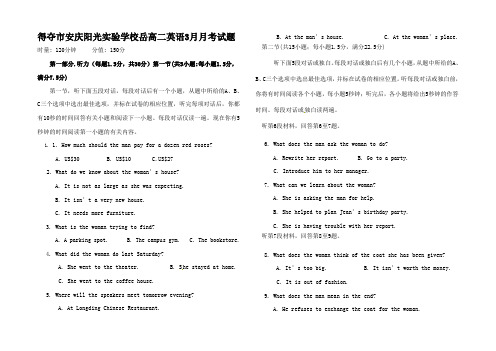
得夺市安庆阳光实验学校岳高二英语3月月考试题时量: 120分钟分值: 150分第一部分.听力(每题1.5分,共30分)第一节(共5小题;每小题1.5分,满分7.5分)第一节,听下面五段对话,每段对话后有一个小题,从题中所给的A、B、C三个选项中选出最佳选项,并标在试卷的相应位置,听完每项对话后,你都有10秒的时间回答有关小题和阅读下一小题。
每段对话仅读一遍。
现在你有5秒钟的时间阅读第一小题的有关内容。
1. 1. How much should the man pay for a dozen red roses?A. US$30B. US$10$272. What do we know about the woman’s house?A. It is not as large as she was expecting.B. It isn’t a very new house.C. It needs more furniture.3. What is the woman trying to find?A. A parking spot.B. The campus gym.C. The bookstore.4. What did the woman do last Saturday?A. She went to the theater.B. She stayed at home.C. She went to the coffee house.5. Where will the speakers meet tomorrow evening?A. At Longding Chinese Restaurant.B. At the man’s house.C. At the woman’s place.第二节(共15小题;每小题1.5分,满分22.5分)听下面5段对话或独白。
每段对话或独白后有几个小题,从题中所给的A、B、C三个选项中选出最佳选项,并标在试卷的相应位置。
高二上学期第三次月考英语试卷.doc
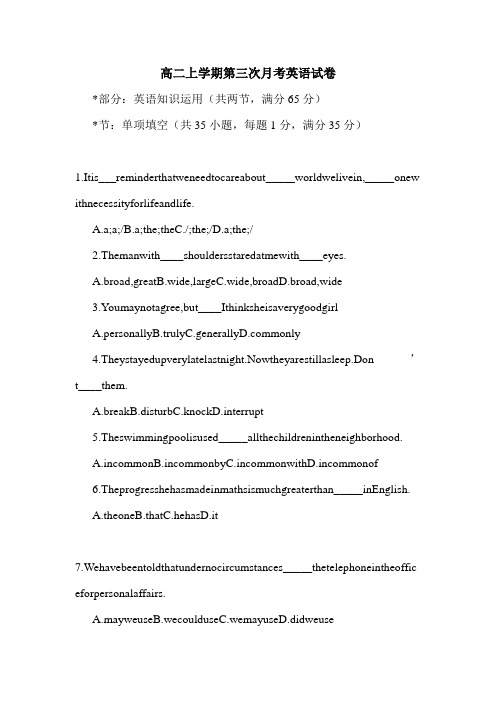
高二上学期第三次月考英语试卷*部分:英语知识运用(共两节,满分65分)*节:单项填空(共35小题,每题1分,满分35分)1.Itis___reminderthatweneedtocareabout_____worldwelivein,_____onew ithnecessityforlifeandlife.A.a;a;/B.a;the;theC./;the;/D.a;the;/2.Themanwith____shouldersstaredatmewith____eyes.A.broad,greatB.wide,largeC.wide,broadD.broad,wide3.Youmaynotagree,but____IthinksheisaverygoodgirlA.personallyB.trulyC.generallymonly4.Theystayedupverylatelastnight.Nowtheyarestillasleep.Don’t____them.A.breakB.disturbC.knockD.interrupt5.Theswimmingpoolisused_____allthechildrenintheneighborhood.A.incommonB.incommonbyC.incommonwithD.incommonof6.Theprogresshehasmadeinmathsismuchgreaterthan_____inEnglish.A.theoneB.thatC.hehasD.it7.Wehavebeentoldthatundernocircumstances_____thetelephoneintheoffic eforpersonalaffairs.A.mayweuseB.wecoulduseC.wemayuseD.didweuse8.Thepolicemansignedforthedriverto_____andthencheckedhisdrivinglicen se.A.setasideB.breakdownC.stopoverD.pullover9.Themostexcitingthingforhimwas______hefinallyfoundtwotinnedfruitsin ______seemedtohimtobeaservant’sbedroom.A.that;whatB.what;whichC.that;thatD.what;where10.Thelittleboyisn’tgettingonwellinmathsandworsestill,heisevenunwillingtogotoschool.With herson_____,shefeelsvery______.A.disappointing;worryingB.disappointing;worriedC.disappointed;worriedD.disappointed;worrying11.WhenIturnedtotheperson_____nexttome,Irecognizedthathewasmyscho olmate.A.seatingB.seatedC.sitD.sat12.TheShaolinTemple_____1400yearsagohasbecomeatouristattraction.A.datesbacktoB.datingbackC.datesfromD.datingfrom13.Hewasgladtolearn____wasamongthenamesadmittedtotheuniversity.A.itB.thatC.heD.his14.---Wheredidthemurderhappen?---Itwasinthehouse_____mygrandmotherusedtolive.A.thatB.whereC.whichD.inwhich15.Iwas_______inthemiddleofthecall,forIhadnocoinstoputintothebox.A.hungupB.calledoffC.cutoffeoff16.Hesatthere,silentanddepressed,withhiseyes____ontheceiling.A.fixingB.beingfixedC.fixedD.tobefixed17---Musttheyhandintheircompositionstomorrow?---No,they______handtheminthisafternoon.A.aregoingtoB.aretoC.needn’tD.can’t18.Thatdaywasamostexcitingmomentforthefootballfans,____forthefirstti me,theirfootballteamwontheWorldCup.A.whenB.whichC.whileD.ontheday19.–What’sthematterwithyourfinger?–I______inthedoorjustnow.A.gotittocatchB.gotitcaughtC.gotitcatchingD.gottocatchit20.It’sreportedthataplanewithfivepeople______crashedintothemountainseveral daysago.A.onboardB.ontheboardC.inboardD.intheboard21.Itwas10o’clock____thebigfirebrokeout,______5peoplelosttheirlives.A.that,whichB.when,whichC.that,whereD.when,where22.Theprofessortriedhisbesttomakehislectureeasy________.A.understoodB.tounderstandC.understandingD.tobeunderstood23.Althoughthereweremanypeopleinthesquare,Icould____myoldfriend.A.pickupB.makeupC.pickoutD.leaveout24.---DoesBilldohisnewjobwell?---______hisoldjob.I’mafraidthere’snohopeforhim.A.NotbetterthanB.NotdowellasC.NobetterthanD.Notaswellas25.---Doyoureallywanttogoout?---Itmayrain.____Ishallgoout.Idon’tmindtherain.A.AnywayB.OtherwiseC.NowthatD.Orelse26.---Marylookssad.Didyoutellheraboutthebadnews?---Yes,butI______herlater.A.shouldhavetoldB.shouldn’thavetoldC.musthavetoldD.needn’thavetold27.---Whatlies______themountains?---Abeautifulfreshlake.A.overB.acrossC.beyondD.through28.--HasMr.Robee______?--Itwilltakeaperiodoftwoweeksafterhisoperation.A.recoveredB.uncoveredC.discoveredD.restored29.Allthepartsoftheproductsrequiretestingagainbeforetheyare_______.A.forsaleB.onsaleC.soldoutD.tosale30.Onceyouareinanewculture,youneedto_____yourselfforatime,beforeyou ______itA.fit;getusedtoB.suit;usedtoC.adjust;getusedtoD.correct;usedto31.--It’simpossiblethatJoneswillpassthedrivingtest.--Butshewishshe______.A.doesB.wouldC.shouldD.will32.----CanIlookatthemenuforamoreminutesbeforeIdecide?---Ofcourse.________Sir.A.MakeyourselfathomeB.EnjoyyourselfC.Itdoesn’tmatter.D.Takeyourtime33.He_______upearlysincehischildhood.edtogetB.isusedtogetC.hasbeenusedtogetD.hasbeenusedtogetting34.Seeingthehappy________ofchildrenplayinginthepark,I’mfullofjoyandconfidenceinthefutureofourcountry.A.sightB.sceneC.viewD.sign35.---Whichofthetwoshirtswouldyouliketotake?--__________.There’snotmuchdifferencebetweenthem.A.AnyoneB.EitherC.BothD.None第二节:完形填空(共20小题,每小题1.5分,满分30分)阅读下面短文,掌握其大意,然后从所给的A、B、C、D四个选项中,选出一个*佳选项,并在答题卡上将该项涂黑。
高二英语第三月考试题
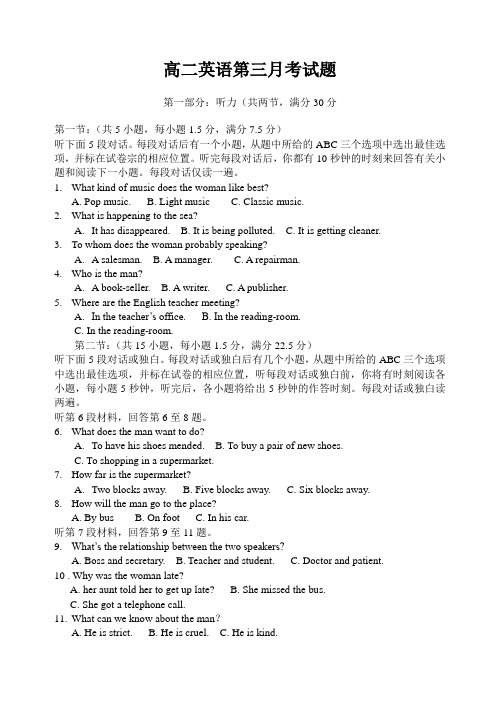
高二英语第三月考试题第一部分:听力(共两节,满分30分第一节:(共5小题,每小题1.5分,满分7.5分)听下面5段对话。
每段对话后有一个小题,从题中所给的ABC三个选项中选出最佳选项,并标在试卷宗的相应位置。
听完每段对话后,你都有10秒钟的时刻来回答有关小题和阅读下一小题。
每段对话仅读一遍。
1.What kind of music does the woman like best?A. Pop music.B. Light musicC. Classic music.2.What is happening to the sea?A.It has disappeared.B. It is being polluted.C. It is getting cleaner.3.To whom does the woman probably speaking?A. A salesman.B. A manager.C. A repairman.4.Who is the man?A. A book-seller.B. A writer.C. A publisher.5.Where are the English teacher meeting?A.In the teacher’s office.B. In the reading-room.C. In the reading-room.第二节:(共15小题,每小题1.5分,满分22.5分)听下面5段对话或独白。
每段对话或独白后有几个小题,从题中所给的ABC三个选项中选出最佳选项,并标在试卷的相应位置,听每段对话或独白前,你将有时刻阅读各小题,每小题5秒钟,听完后,各小题将给出5秒钟的作答时刻。
每段对话或独白读两遍。
听第6段材料,回答第6至8题。
6.What does the man want to do?A.To have his shoes mended.B. To buy a pair of new shoes.C. To shopping in a supermarket.7.How far is the supermarket?A.Two blocks away.B. Five blocks away.C. Six blocks away.8.How will the man go to the place?A. By busB. On footC. In his car.听第7段材料,回答第9至11题。
三中学15—16学年上学期高二第三次月考英语试题(实验班)(附答案)

2015年下学期高二第三次月考英语试卷(实验班)第一部分:听力测试(共两节,满分30分)第一节(共5小题;每小题1.5分,)听下面5段对话。
每段对话后有一个小题,从题中所给的A、B、C三个选项中选出最佳选项,并标在试卷的相应位置。
听完每段对话后,你都有10秒钟的时间来回答有关小题和阅读下一小题。
每段对话仅读一遍。
1.What was the woman’s birthday gift?A. A phoneB.A bookC. A coat2.Where will the woman have the party?A.At the man’s houseB. At a restaurantC. At her house3.When did the man buy the shoes?A.Three weeks agoB. Two weeks agoC. Three days ago4.How did the man get injured?A.By playing basketballB. By playing tennisC. By running5.What does the woman think of her piano playing?A.She is very professional.B.She is still a beginner.C.She doesn’t know how to play at all.第二节(共15小题;每小题1.5分)听下面5段对话或独白。
每段对话或独白后有几个小题,从题中所给的A、B、C三个选项中选出最佳选项,并标在试卷的相应位置。
听每段对话或独白前,你将有时间阅读各个小题,每小题5秒钟;听完后,各小题将给出5秒钟的作答时间。
每段对话或独白读两遍。
听第6段材料,回答第6至7题。
6.When will the woman go to the library?A.On ThursdayB. On FridayC. On Saturday7.What does the man want to borrow?A.BooksB. VideosC. Magazines听第7段材料,回答第8 至9题。
高二英语上学期第三次月考试题无答案word版本 副本
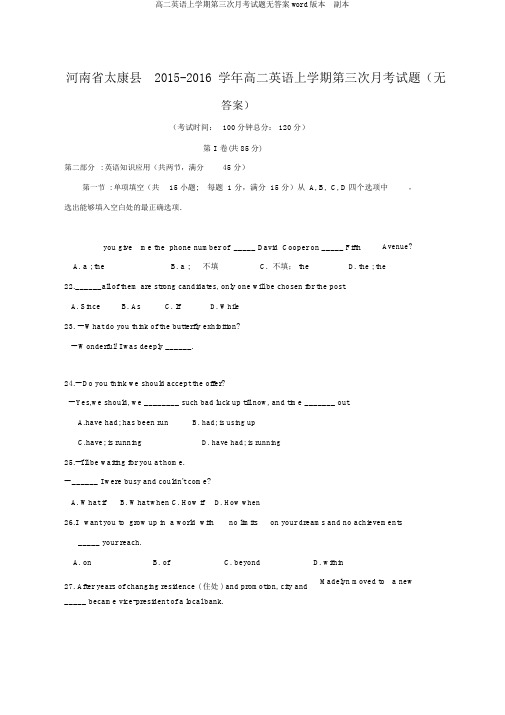
河南省太康县 2015-2016 学年高二英语上学期第三次月考试题(无答案)(考试时间:100分钟总分: 120分)第 I 卷(共 85分)第二部分: 英语知识应用(共两节,满分45 分)第一节: 单项填空(共15小题;每题 1 分,满分 15 分)从 A, B, C, D四个选项中,选出能够填入空白处的最正确选项.you give me the phone number of _____ David Cooper on _____ Fifth Avenue?A. a ; theB. a ;不填C. 不填; theD. the ; the22.______all of them are strong candidates, only one will be chosen for the post.A. SinceB. AsC. IfD. While23.-- What do you think of the butterfly exhibition?--Wonderful! I was deeply ______.24.-- Do you think we should accept the offer?-- Yes,we should, we ________ such bad luck up till now, and time _______ out.A.have had; has been runB. had; is using upC.have; is runningD. have had; is running25.--I'll be waiting for you at home.-- ______ I were busy and couldn't come?A. What ifB. What whenC. How ifD. How when26.I want you to grow up in a world with no limits on your dreams and no achievements_____ your reach.A. onB. ofC. beyondD. withinMadelyn moved to a new27. After years of changing residence ( 住处 ) and promotion, city and_____ became vice-president of a local bank.A. eventuallyB. occasionallyC. accidentallyD. frequently_____ 28. In June 2000, Hanks was offered a scholarship to study in New York Cityhe could have supported his family, but he refused it.A. by whichB. through whichC. with whichD. in which29.. Eric helped to explain some things about community medicine to Barack, andof course his ideas were affected by Barack _____ health care.A. thought aboutB. to think aboutC. think aboutD.thinking about30.Which do you feel like ________ the time on the train, chatting withfriends or just reading something?A. killing B.to share C.to killD. sharing31.He is a financial manager in Wall Street now, but nobody knows he ________part-time jobs here and there for survival for eight years.A. doesB. didC. had doneD. has done32. ----Can you attend tomorrow’ s meeting?----I am sorry , but I will have too much work__________.A. to see to to come B . seeing to come C . to see to coming D.doing to come33. Alice, you’ d better put the vase away ________ it gets broken.A. whenB. beforeC. unlessD. while34. ________ anything, give me a call and I'll be glad to help you.A. Had you required B.Should you requireC. Would you require D. Could you require35.----Would you like some sweets, dear?----______, I have a sweet tooth.A. Of course, thank youB. No, thanksC. I’ ve got itD. I don’ t think so第二节完形填空(共 20小题;每题 1. 5分,满分30 分)阅读下面短文,掌握其粗心,从每题所给的A、B、C、D四个选项中,选出最正确选项,并在答题卡大将该项涂黑。
- 1、下载文档前请自行甄别文档内容的完整性,平台不提供额外的编辑、内容补充、找答案等附加服务。
- 2、"仅部分预览"的文档,不可在线预览部分如存在完整性等问题,可反馈申请退款(可完整预览的文档不适用该条件!)。
- 3、如文档侵犯您的权益,请联系客服反馈,我们会尽快为您处理(人工客服工作时间:9:00-18:30)。
香河三中高二英语第三次月考试卷第一节(共15小题;每小题2分,满分30分)阅读下列短文,从每题所给的四个选项(A、B、C、和D)中,选出最佳选项,并在答题卡上将该项涂黑。
AHow often one hears children wishing they were grown-ups and old people wishing they were young again. Each age has its pleasures and its pains, and the happiest person is the one who enjoys what each age gives him without wasting his time in useless regrets.Childhood is a time when there are few responsibilities to make life difficult. If a child has good parents, he is fed, looked after and loved, whatever he may do. It is impossible that he will ever again in his life be given so much without having to do anything in return. In addition, life is always presenting new things to the child —things that have lost their interest for older people because they are too well-known. But a child has his parents. He is not so free to do what he wishes to do; he is continually being told not to do things or being punished for what he has done wrong.When the young man starts to earn his own living, he can no longer expect others to pay for his food, his clothes, and his room, but has to work if he wants to live comfortably. If he spends most of his time playing about in the way that he used to as a child, he will go hungry. And if he breaks the laws of society as he used to break the laws of his parents, he may go to prison. If, however, he works hard, keeps out of trouble and has good health, he can have the great happiness of building up for himself his own position in society.1. According to the second paragraph, the writer thinks that __.A. life for a child is comparatively easyB. a child is always loved whatever he doesC. if much is given to a child, he must do something in returnD. only children are interested in life2. After a child grows up, he __.A. will have little time playingB. has to be successful in finding a jobC. can still ask for help in time of troubleD. should be able to take care of himself3. The underlined word "responsibilities" in the second paragraph means__________.A. dutiesB. jobsC. suggestionsD. desires4. The main idea of the passage is _________ .A. life is not enjoyable since each age has some painsB. young men can have the greatest happiness if they work hardC. childhood is the most enjoyable time in one's lifeD. one is the happiest if he can make good use of each age in his lifeBWhen was the last time you lost something? What was it?According to a recent survey, we spend about ten minutes a day looking for lost things. Over an average lifetime, this adds up to an incredible 3,680 hours (or 153 days). Is there anything we can do about it?The study of 3,000 adults was carried out by home insurance company Esure. They found that mobile phones and car keys were the most frequently lost items. Other things on the list included: house keys, bills, sunglasses, wallets, bank cards, watches, jewellery (particularly rings and earrings).So, what‟s going on? “Most blame it on a busy lifestyle,” says Nikki Sellers, t he head of Esure. Others say it‟s the fault of spouses (配偶) or children for not putting things back where they belong. A few admitted to untidiness, absent-mindedness and a poor memory, with some wishing they were more organized.What‟s the solution? “You need to choose a particular place for something and a lways put it back there,” said Nikki Sellers. “And you need to make sure everyone else in the house knows where to put it back too. You also need to keep your house tidy, label boxes clearly and find a place near the front door for all the items that you need in the morning. A good idea would be to have a shelf there with a bowl for your keys, purse, wallet and anything else.” she added.If you are still having trouble finding things, don‟t worry — things could be a lot worse: fourteen people in the survey said they spent over an hour every day looking for lost items. Surely you can‟t be as bad as that!5. According to the survey, which do people lose most frequently?A. House keys.B. Cell phones.C. Bank cards.D. Sunglasses.6. The majority of people surveyed think that they lose something because of _______.A. lack of organization.B. their bad memoryC. the fault of their family membersD. their busy life7. From the text we learn that ________.A. many people in the survey spend over an hour looking for the lost itemsB. Nikki Sellers suggests always putting things back where they wereC. the author is quite worried about those who have trouble finding thingsD. a shelf near the front door is a must if you are to avoid losing moneyCExperts say it is not easy to get used to life in a new culture. “ Culture shock” is the term these experts use when talking about the feelings that people have in a new environment. There are three stages of culture shock, say the experts. In the first stage, the newcomers like their new environment. Then, when the fresh experience dies, they begin to hate the city, the country, the people and everything else. In the last stage, the newcomers begin to adjust to their surroundings and, as a result, enjoy their life more.There are some obvious factors in culture shock. The weather may be unpleasant. The customs may be different. The public service systems---the telephone, post office ,or transportation --may be difficult to work out. The simplest things seem to be big problems. The language may be difficult.Who feels culture shock? Everyone does in this way or that. But culture shock surprises most people. Very often the people having the worst culture shock are those who never had any difficulties in their home countries and were successful in their community. Coming to a new country, these people find they do not have the same established positions. They findthemselves without a role, almost without an identity. They have to build a new self-image.Culture shock causes a feeling of disorientation (迷惘). This feeling may be homesickness. When homesick, people feel like staying inside all the time. They want to protect themselves from the strange environment, and create an escape inside their room for a sense of security. This escape does solve the problem of culture shock for the short term, but it does nothing to make the person familiar with the culture. Getting to know the new environment and gaining experience--these are the long-term solutions to the problem of culture shock.8.According to the passage, the more successful you are at home, _________________.A. the fewer difficulties you may have abroadB. the more difficulties you may have abroadC. the more money you will earn abroadD. the less homesick you will feel abroad9.Which of the following is NOT right according to the passage?A. “Culture shock” is a term used to describe the feelings that people experience in a newenvironmentB. In the second stage of “ Culture shock”, people may hate the life in the newenvironmentC. When you are homesick, you had better not stay at home all the timeD. Every one of us doesn‟t feel culture shock in this way or that10.What is the main idea of the last paragraph?A. Escape unfamiliar environmentB. The feeling of homesicknessC. The best way to overcome (克服、战胜)culture shock: get familiar with the new cultureD. Homesickness can solve the problem of culture shock11.What‟s the meaning of the underlined word adjust?A. comeB. pastC. adaptD. setDWhen I decided to get married, my father decided to share some wisdom. “Lori, it is just as easy to love a rich man as it is to love a poor man, “ he said. My boyfriend didn‟t have much money, but I loved him. “What?” I cried. “ How can you say that? I want to marry for love, NOT for money.” “ But why not marry someone you love who has money?” he asked. “Rich men are materialistic(物质主义的). I‟d rather marry a poor man who loves me,” I said and he gave in.And as we went on, with my family growing, I learned why my father put such importance on money. We had to cover the rent, car, electricity, food, and medical bills. We were under lot of pressure. The worries over whether we would be asked to move out or if we had the money to wash our clothes at the Laundromat this week made me question if I did the right thing by marrying a “poor” man.I realized that I had entered the ranks of the poor. Not that I‟d ever been rich. Most of my life, I considered us in the lower middle-class rank. We had a house of our own, food on the table, cars, clothes, and money for college. But now, as I listened to an apartment neighbour talk about her monthly “Mother‟s Day” gift, I realized she was talking about her welfare check(政府发放的救济金). And another young mother tried to “help” me out by connecting me with a friend who stole baby clothes from a department store. “ For a small cut,” she said, “ I could return my …purchase‟(购买的东西)for cash.” It made me sick. How poor was I?I had a college education but wasn‟t using it. I insisted on not missing a minute of ourchildren‟s childhood and it came at a price. My husband was working as hard as he could and it wasn‟t enough. But somehow we made it.The kids grew. Today, we look back and see the great values gained by going through those hard years. My children are not materialistic. They never thought they were poor growing up because we always managed to give a little bit of food, money, or clothes to the “poor”. They were satisfied with the simple things in life that come free such as a beach day or a horse back ride from their dad.We had our worries, but we still treasured our very favorite part of the day when we‟d nest (栖息地)under the covers and talked about our future, the kids and how much we loved each other. Sure our financial(财政的) troubles caused a lot of fights, but we didn‟t leave each other. We began to live a better life. We moved to a better community(社区)with good schools for the kids. And soon, we‟ll face a new challenge with wealth. But we‟ll never give up.My father died three years ago. Before he died, he knew I made the right choice. I‟m proud of my decision.12.After getting married, the writer questioned if she had done the right thing to marry herhusband because___________.A. she was often scolded(责骂)by her fatherB. she found her husband was irresponsible(不负责任的)C. he didn‟t think her husband loved her deeplyD. they lived a poor life with children to support13.After their children were born, the writer_______________.A. often regretted not using her college educationB. worked very hard in order to make more moneyC. had to steal baby clothes from a department storeD. looked after her children as a professional (职业的,专业的)housewife14. Why didn‟t the writer‟s children think they were poor growing up?A. Because the writer always gave them whatever they wantedB. Because the writer and her children often helped other people.C. Because the writer didn‟t let her children play with their rich neighboursD. Because the writer let her children have a good life through receiving help from others.15.What do you think is the theme(主题)of the story?A. Women should always make a decision by themselvesB. Listening to the old is important when people get marriedC. Money doesn‟t matter as much as love in marriageD. Children don‟t mind whether they have a poor family or not第二节(共5小题;每小题2分,满分10分)根据短文内容,从短文后的选项中选出能填入空白处的最佳选项。
